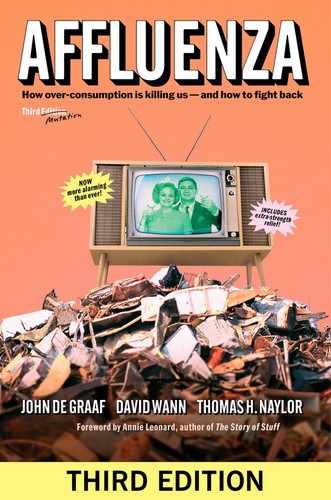FOREWORD
When Affluenza was first published in 2001, its diagnosis of the sickness in consumer society and its prescriptions for the cure stood in marked contrast to the nation’s prevailing optimism. The American economy was at a postwar peak. The stock market had tripled in the previous decade, topping the once-unimaginable 10,000 level. Soaring housing values were making ordinary homeowners rich (on paper, at least). The first dot-com boom was minting young millionaires and billionaires in the high-tech entrepreneurial class.
Then the World Trade Center attacks sent the stock market plunging, triggering a recession and exposing the hollowness of a system whose leaders advised us that the patriotic response to terrorism was to go shopping. In the years following, the dot-com boom went bust, and the near-collapse of corrupt financial institutions plunged millions of homeowners into debt and foreclosure. Today, even as the economists tell us the Great Recession has ended, the real unemployment rate—those without work, those who need more work, and those who have stopped looking—remains scandalously high. The Occupy movement has sharpened awareness of the inherent inequities of an economy in which the wealthiest get richer and richer while most of the rest of us work longer hours with less job security, health insurance, and retirement security just to keep our heads above water.
But if Affluenza was ahead of its time, more than ever its time is now.
From book groups to congregations to classrooms, Affluenza has become an enduring classic—not only for its insight into the emptiness and unsustainability of a system based on ever-expanding consumption but also for boldly pointing a way out. Its ultimately hopeful message—that it is possible to build a society based on not more but better, not selfishness but sharing, not competition but community—has inspired millions to rethink their lives and question the status quo. Its very title has become a part of the language, an indispensable tool for describing the ills of a society where, to paraphrase the personal-finance guru Dave Ramsey, we work too much to buy things we don’t need with money we don’t have to impress people we don’t even know. It has played an immeasurable role in informing my own work on The Story of Stuff films, which the authors so generously cite in chapter 22.
The third edition of Affluenza is in many ways a new book. The first edition was an outgrowth of a PBS TV special of the same name; this revision goes deeper in its analysis, providing a somewhat more serious discussion of the issues. The data and references cited in the text and footnotes have been extensively updated to reflect the many changes that have rocked the world in the past thirteen years. The authors want this book to contribute to the rich and exciting discussions that are taking place everywhere about community, citizenship, and voluntary simplicity. If we take their lessons to heart, perhaps a future edition will be a history of how we found a cure for the plague of affluenza.
Annie Leonard, author of The Story of Stuff
Berkeley, California
July 2013
